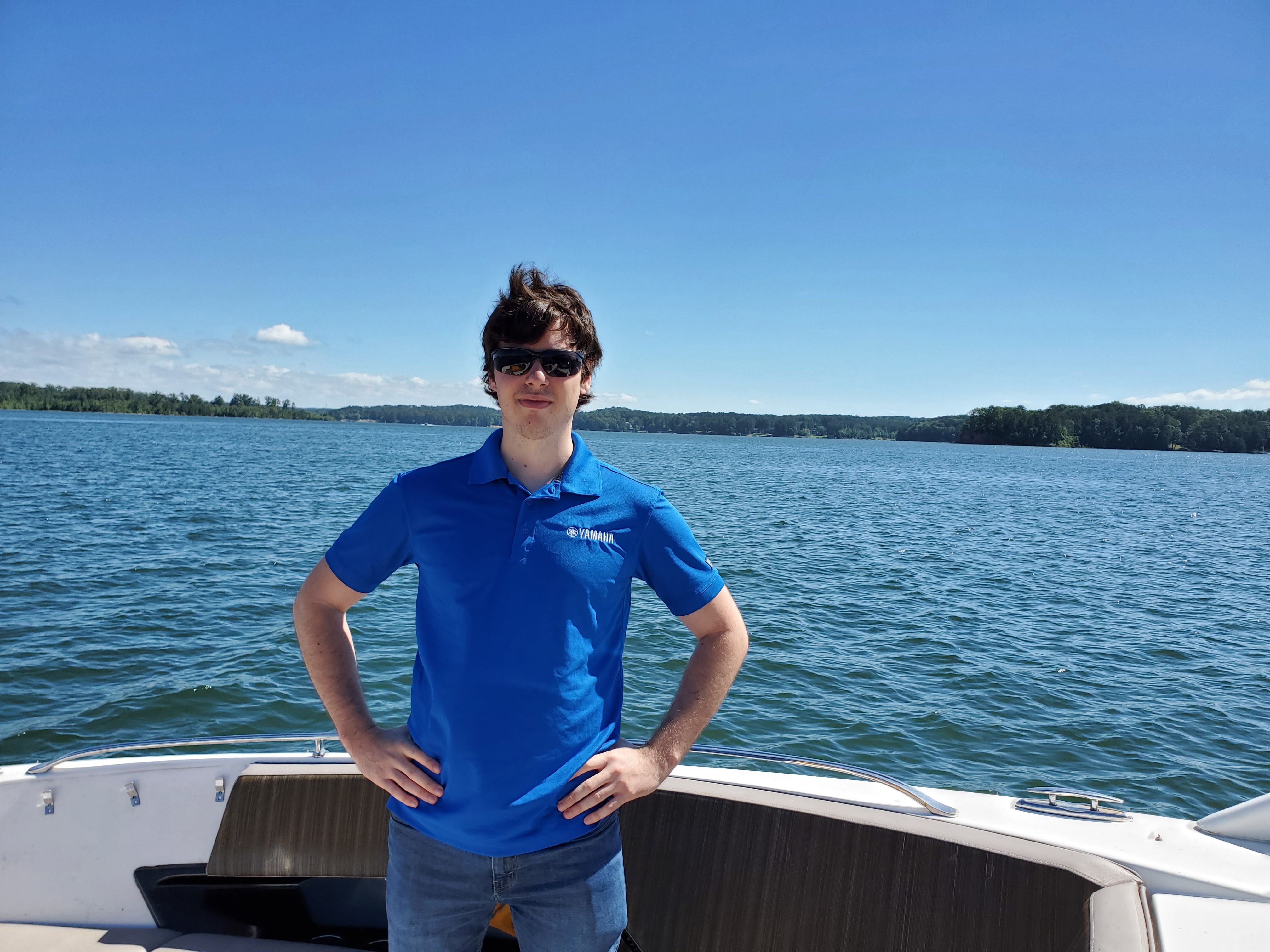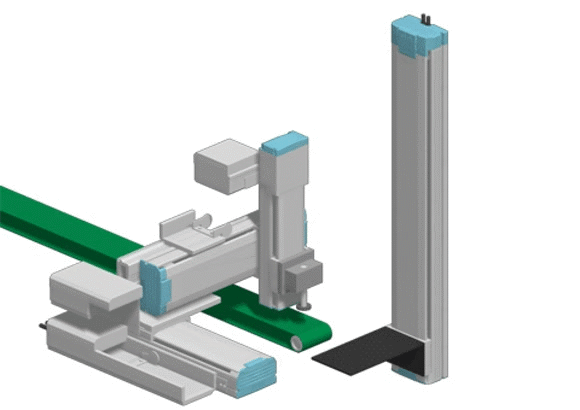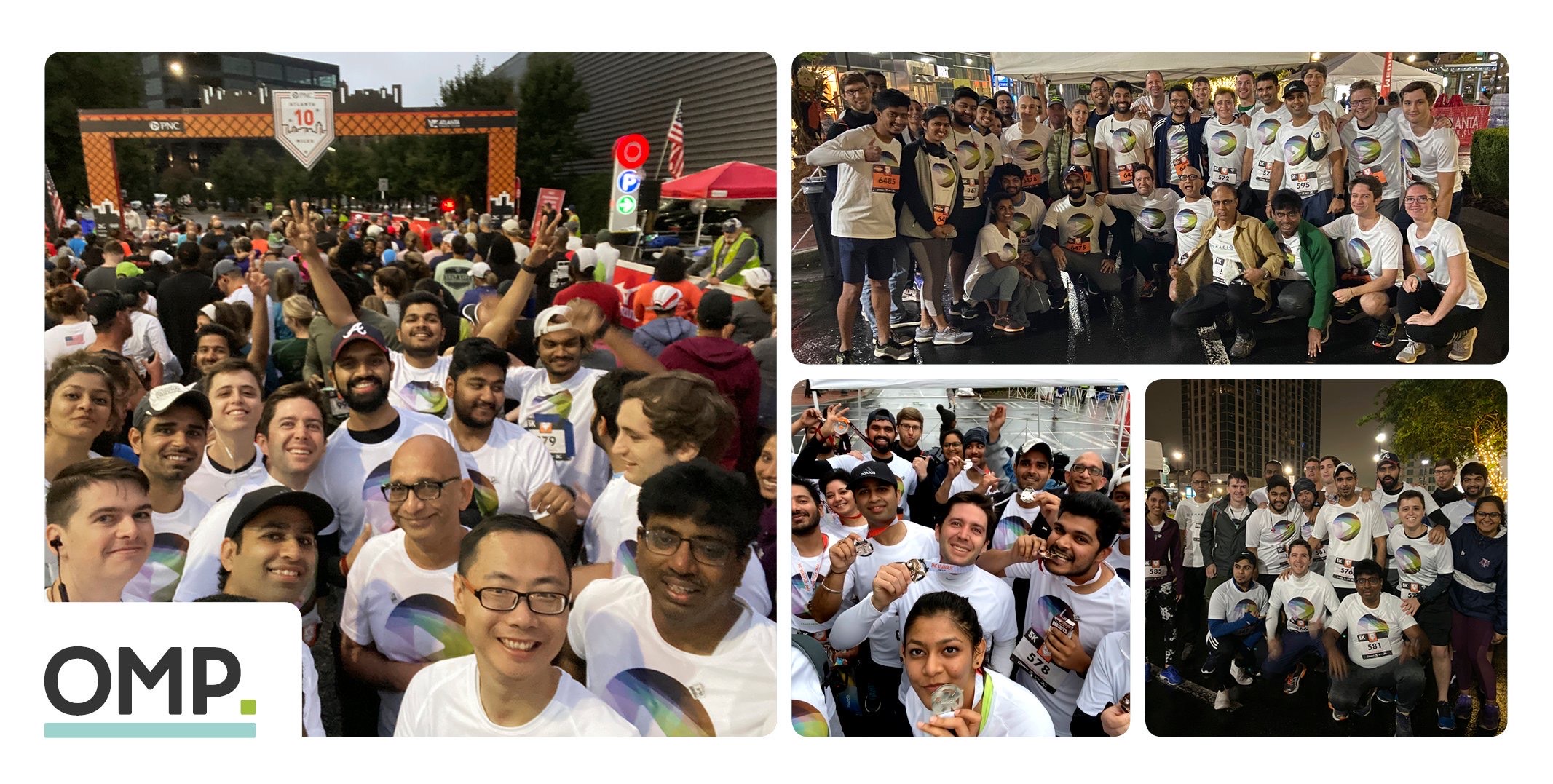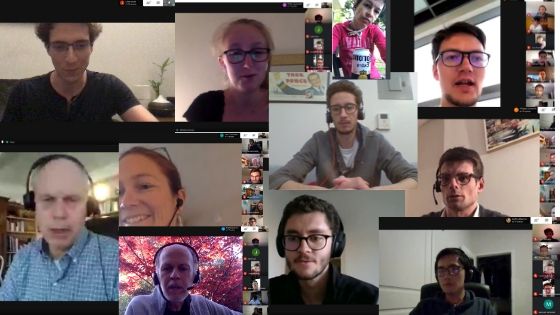- Details
Thomas Gurriet (Cl 212), robotics engineer at Yamaha Motor Corporation, is our first interviewee for the new "People and Robots" series. Enjoy the reading!
AFAM: Thomas, first of all, congratulations! Since February, you have started working as a robotics engineer for Yamaha Motor Corporation in the state of Georgia. It coincided with the start of COVID-19 outbreak. How were your first months at Yamaha Motor?
Thomas: Thank you! Yes, I’ve been pretty lucky in that regard as I started there only 2 weeks before the confinement and hiring freeze. So far things are going great, plenty of work to do and things to develop which is exiting.
AFAM: can you tell us a bit more about your job? We assume, you were among several candidates for this position and the interview process was difficult. Why do you think you were the most successful candidate? How does being a gadz’art help you?
Thomas: I cannot give too many details as you can imagine but essentially I joined a brand new R&D division at Yamaha Motor US with the goal of developing Smart Boat features and products. We are still a very new and small team so we each have to take on multiple parts of the project at the same time, which makes the job super challenging and interesting. To be honest, there was no competition for the job. Yamaha is not really on people’s radar when it comes to tech companies, and Kennesaw Georgia is no silicon valley. I learned about the job from a good friend of mine I worked with while finishing my master at GeorgiaTech. He was looking for a robotics job near Atlanta right when Yamaha started hiring their first engineers for the project. He got the job and so we kept in touch until I finished my PhD and decided to join the team. If it wasn’t for the Gadz’art curriculum which emphasized the importance of developing a professional network I would certainly not be here now.
AFAM: Being in robotics today, is it just about seizing business opportunities or about changing the world?
Thomas: For me it’s about meeting great people, continuing to learn and develop knowledge and skills, so that hopefully one day we can make a difference. Though getting to a position where one can decisively impact the world for the better requires some form of financial success and prosperity so it’s definitely a bit of both.
AFAM: robotics is a very broad sector. There are a lot of industries impacted by automation nowadays – transportation, manufacturing, healthcare, services, food (read our interviews in Food for Thought series), to mention a few. Which of the industries are undergoing the biggest transformations today according to you and where to look for major opportunities? What robotics companies/startups were impressive for you in the past year – 2 years? Could you give us TOP 5 US robotics startups to follow?
Thomas: I think you laid out the major ones. I could add the entertainment/film industry where we are seeing an increasing use of drones and robotic manipulators for camera operation. In terms of opportunities I think preventive health care is the big one both in terms of business and positive impact on society. In terms of startups, in think Neuralink is THE company to follow in the years to come as what they are developing can really be a game changer for humanity. They are supposed to start human trials within a year so it will be interesting to see what they can achieve.
AFAM: we have a lot of students every year looking for internship and later on, job opportunities in robotics (including on the US market). What advice would you give to these students? What skills and knowledge are crucial to acquire to be successful searching for an internship in robotics?
Thomas: I think the most important is to develop your network as early as possible and get involved with people in your field of interest. Robotics labs in universities is where a lot of roboticists start their career and I would encourage someone who’s interested in robotics to join such a lab for a master or a PhD. It’s a one of a kind opportunity to meet smart people and find career/business opportunities while having time to learn and broaden your skillset. Getting into a good robotics lab can be just as challenging as getting a job in a top tech company because of the ridiculous ratio between spots and applications. What I recommend is directly go the lab’s grad students and help with their research. From my experience, the lab’s students weigh in the selection process much more than one might expect. A lot of prospective undergrads will try to get involved with the lab, but in my experience most will end-up not doing anything by lack of interest or because they are too focused on classes, so there is a real opportunity for truly motivated people that are ready to put in the hours to get noticed and secure a position in the lab. When it comes to knowledge and skills, I think it’s important to broaden them as much as possible while still focusing on one specific area of expertise. Robotics is the intersection of a lot of fields, and understanding these connections and interplay is fundamental when designing and building complex systems. In terms of skills, I consider programming to be a must so as to be able to develop the tools you need to solve problems you encounter. Having solid math and physics foundations is also important when it comes to designing the algorithms to control the robots. Finally, I think that having an up to date knowledge of the technics, tools and software than can be leveraged to solve engineering problems in your area of interest is also fundamental, and can make a big difference in terms of who can solve a problem and who cannot.
AFAM: Thank you, Thomas, for replying to our questions. Good luck with you new job and let's keep in touch!

Thomas on the test boat on Allatoona lake (Photo: courtesy of Thomas Gurriet)

Controlling Cartesian robot and single-axis robot with a single controller (picture credit: www.global.yamaha-motor.com)
More about robotics:
https://www.roboticsbusinessreview.com
http://www.yamaha-motor-georgia.com
Other interviews in "People and Robots" series:
- Details
In May 2020 board elections took place online. AFAM members could renew our non-profit leadership team by electing new board members.
Here is the new Executive Team and Board of Directors.
Congratulation to Xavier Wartelle (Li 82) and Yarith Phay (Bo 191) on becoming new CEO and Secretary of AFAM.
"We need to preserve what we have built so far and reinforce it. We at AFAM need to maintain the link with the US Gadz community, the Shasta program and our donation flow. We also need to maintain our excellent relationship with the A&M ecosystem. I think we can improve on each of these points and we can do more! " - said Xavier before being elected as CEO.
All AFAM team and AFAM community would like to thank Eric Benhamou (Ai 72) who has been successfully leading AFAM for 13 consecutive years.
"I was the Founding President in 2007, and am proud of what our founding team has accomplished in over a decade, establishing the Arts et Metiers brand in the US and rallying the Gadz’Arts community. While we do not have term limits in our by-laws, I deeply believe in the benefits of leadership renewal. It is time for a new leader to take this organization to the next stage, who believes like me in the importance of building our community in the US. Xavier Wartelle, who co-founded AFAM with me, has the commitment to serve in this capacity and, together with Marc Amblard as CFO, will do a great job leading our organization. I will continue to support AFAM, as a board member and contributor." - said Eric in May.
Thomas Ferre (Bo 200) stepped down from a Secretary position but will continue to serve on a board supporting our organization.
Thank you, Thomas, for your hard work and dedication!
Marc Amblard (Cl 84) will continue serving as CFO. Six other gadz'arts were reelected:
Jean-Luc Nauleau (An 81), Nicolas Horde (Ai 214), Louis Renaux (Cl 216), Jean Pommier (An 183), Aurore Prévot (Li 98) and Jean-Baptiste Commans (Li 203).
Eric Tran (Ch 94), Mattia Pelissou (Li 216) and Sacha Ghebali remain ex officio members as they lead regional gadz'arts groups in the US.
School will be represented by Audrey Stewart who is AFAM board member since 2010.
Philippe Claret (Ai 178) will remain La SOCE board representative.
Arts et Metiers Foundation will be represented by both Louis Castex and Charles Dehelly (Ch 170). Congratulations to Charles Dehelly who recently became Arts et Metiers Foundation President following Roger Stanchina's departure.
Prof Laurent Champaney, President Arts et Métiers said after the election: "I would first of all like to thank Eric Benhamou for his vision back in 2007 in bringing the Arts et Métiers community together in the US. The many AFAM activities over the last 13 years : the Shasta internship program, student grants , alumni social and networking events, have contributed towards building awareness of the Arts et Métiers brand in the US. The school is proud to remain part of the AFAM board and looks forward to working with Xavier Wartelle and all board members and alumni to strengthen the Arts et Métiers brand and develop the A&M ecosystem throughout the US."
For more information:
The new Executive Team and Board of Directors
- Details
What next for American Friends of Arts et Metiers?
I am Xavier, Li 82 and co-founder of American Friends of Arts et Metiers and I am a candidate for the AFAM CEO position after being a board member since its inception.
I came to Silicon Valley 25 years ago. I became impassioned by tech start-ups and I launched 6 startups myself resulting in 4 acquisitions. I also co-founded the French Tech Hub and big bang factory, two startup accelerators. I love new ventures and entrepreneurs.
I cannot write this note without sharing my gratitude and my admiration for Eric Benhamou. After a successful career, Eric is a recognized leader in Silicon Valley. He initiated AFAM in 2007 and led our group, with a long term vision of helping the school and its students, gathering the US Gadzart community and developing the Arts et Metiers brand in the US.
In 12 years we have accomplished many things as you can see in the 10 years report.
What shall we do next?
First of all, we need to preserve what we have built so far and reinforce it. We at AFAM need to maintain the link with the US Gadz community, the Shasta program and our donation flow. We also need to maintain our excellent relationship with the A&M ecosystem. I think we can improve on each of these points and we can do more!
Engage the community and improve our existing activities.
Shasta can grow to welcome more students and give them a shot at their own American dream; we can organize professional events to promote the Arts et Metiers brand; we can energize the Gadz community; we can start initiatives to encourage Gadz entrepreneurs and we can convince more donors to support all these actions. There are a lot of things to do!
Retooling AFAM with a new way of working together.
We can do more but first, we need to improve AFAM’s organizational structure. My project is to form an Operational Committee with 5 to 8 Gadz motivated to take actions. We will meet on a monthly basis to decide what the priority actions are and distribute them between ourselves. The board will continue meeting on a quarterly basis and committee members will report their actions to the board. I have spoken to several Gadz and 7 people are already interested in participating.
Our community has a formidable strength: many members are willing to commit their time and efforts to our cause. I was always fascinated to see how many Gadz are willing to help or how happy they are to get together. The energy is there: we should funnel it to accomplish more for our school, our students and our alumni.
Xavier
Li 82
- Details
AFAM: Please tell us more about what your consulting role is about?
Cyprien: My role is to address the various Supply Chain challenges that an organization is facing and to enable value-generating Supply Chains. I achieve this by laying down process improvement designs and through their implementation in a unified End-to-End planning solution (including Forecasting, Operational Planning and Scheduling, S&OP, and Network Design).
Simply put, I support large manufacturing companies in finding an executable and optimized way to produce, transport, and sell their products. This is done on both the strategic and operational level while respecting a large variety of constraints such as storage capacity, maximum shelf life, machine utilization constraints, changeover time, supply contracts, and other customer-specific requirements.
In addition to the implementation effort, I advise business leaders in conducting their company's digital transition and in building a standardized and streamlined solution shared organization-wide.
I focus on the chemical industry and work with organizations ranging from niche players to industry leaders. I am also involved in the creation of the US-based optimization competence center and take the role of 'expert' by answering other project team's questions and challenges.
AFAM: How did you get where you are now?
Cyprien: As part of Arts et Métiers' dual degree program, I got the opportunity to study at Georgia Tech for a Master of Science in Supply Chain Engineering. There I learned more about Supply Chain and Operation Research and got involved in multiple projects involving Georgia Tech's industrial partners. This is when I developed a taste for consulting, as I enjoyed discovering and resolving problems of diverse nature.
After finishing my final thesis in partnership with The Home Depot, I was looking for a position that could combine technical and advisory skills. This is when I accepted the position of Supply Chain Consultant at OMP. I have worked at OMP for the past 2 and a half years.
AFAM: What does your typical day look like?
Cyprien: A typical day changes depending on the phase of the project.
A project starts with an analysis phase in which I travel on-site to learn and discuss with business leaders about their planning practices and challenges. I then work with a central team of decision-makers to examine how to prioritize those challenges and find the best way to address them, either through our standard offering or a customer-specific functionality.
From our main office, I collaborate with the internal teams of experts to design the solution. Once the solution is fully designed, I either implement it or supervise its implementation.
Toward the project closure, I demo the solution to the planners that will be using the software. The audience for those demos ranges from ten to a couple hundred of attendants.
Finally, I support the testing of the solution and work on fixing potential defects before the application's go-live.
AFAM: What do you like about your consulting role?
Cyprien: I wholly appreciate the diversity in my tasks and in the challenges I am faced with. I receive exposure to a wide variety of organizations and get to learn from diverse people, from planners to Supply Chain executives. I also learn from solution experts and grow to solve more and more complex challenges.
I am also pleasantly surprised by the responsibilities and trust I am given by my peers, even as a new hire. With hard work and dedication, there are plenty of opportunities to grow within the company and to take your career to the next level.
Finally, there is an incredible sense of accomplishment when a project is delivered. You can feel your impact by measuring the value brought to the customer.
AFAM: What are the challenges of your consulting job?
Cyprien: One of the most challenging things I find is to manage customer expectations and relationships. You will often face executives with an idealized vision of a fully automated planning solution. When challenging their beliefs, it takes time and effort to convince them that you are working in their best interest. Alternatively, planners will often perceive you as the one that will render their job obsolete or at the very minimum disrupt their usual planning practices. The challenge here is to convince them that with advanced planning tools, their time will be spent on high value-added activities while their 'busy work' will be automated. It is important to guide them during the transition.
When working with worldwide organizations, it is also expected that you are available at all times during the week to answer questions or resolve issues that the customer is facing in their live environment. Even though the majority of issues can be resolved by coworkers in different timezones, in the event of a critical defect causing a factory shutdown you can be asked to work at night or during weekends to resolve it.
Finally, for large and strategic projects, it is not uncommon to implement a large number of custom functionalities. Each functionality needs to fit flawlessly with the neighboring ones and compose a coherent global solution. When asked to develop new functionalities, it sometimes feels like adding a new piece to an already complete puzzle. You will then be challenged to come up with a creative design causing the minimum changes to the already established solution while providing the desired value.
AFAM: What skills and qualities do engineers need to be successful consultants?
Cyprien: I found that engineers can be successful consultants. The additional technical and analytical background gives you an edge on other consultants when it comes to problem-solving. It usually results in smarter solutions delivering more value to the customer.
However, communication skills can never be underestimated. Even the best solution will be overlooked if it cannot be communicated comprehensively to the different stakeholders.
A good consultant should also be an excellent listener. The fastest way to learn about an industry is to listen to people that have been in it their entire life, regardless of their background. Being humble will never fail to improve customer relationships and help you deliver more value.
AFAM: What advice would you give to a student who wants to work in consulting? Start as a junior in a large management consulting company, find an internship in a boutique firm, become an expert in a certain field before breaking into consulting........?
Cyprien: I don't think that there is a single way to make it into consulting. My coworkers are coming from a wide variety of backgrounds, sometimes from the industry and even from academia. This diversity of outlook ultimately benefits us all. It is true however that transitioning to consulting later in your career can be difficult and requires some adaptation while the other way around can be easier.
From my experience, I enjoyed starting at a niche consulting firm. I am given a lot of responsibilities that usually fall to more senior positions and the growth opportunity is real. It allows me to focus my skills and quickly become an expert in my field.
I would suggest reading about different career paths that lead to consulting and try to find one that resonates with your aspirations.
AFAM: How did the recent corona virus outbreak influence your day-to-day work?
Cyprien: The fundamentals of the work are unchanged but how we achieve them did. Emphasis is put on coordination meetings with the customer and the rest of the project team to ensure that we are continuously working toward a common goal. Online meetings replaced demos, and it has proven to be challenging to engage an audience through this means.
During these difficult times, I am increasingly involved with some of our strategic customers to fine-tune the different optimization models that were implemented. The models were initially designed to operate in 'balanced' supply chains. Today, they are running in heavily disrupted supply chains: suppliers are defaulting, plants suddenly shut down, demands are uncertain and cross-border transport legislation are constantly changing. My role is to build robust, and reactive optimization models to resolve the many new planning challenges that our clients are facing.
Since the majority of our customer base is considered to be 'essential businesses' (chemical, pharmaceutical, energy industries), a lot of pressure is felt to get our software to work flawlessly. I feel a lot of pride to be a part of the global effort to send commodities to the people in need.

Photo courtesy - Cyprien Bastide: OMP employees during 10 miles charity run in Atlanta
For more information about OM Partners, please visit OM Partners' website
Other interviews in our "Why Consulting?" series
Interview with Claude Leglise (An 74), SVA Innovation
Interview with Maxime Crépin (Bo 210), Bain and Company
Interview with François Théry (Li 96), Accenture
- Details
COVID-19 outbreak took people apart introducing shelter in place and social distancing everywhere but fortunately we have Internet! Gadz all over the US gathered online in the evening on March 31st to take apero together. There were alumni and students from SF bay area, south California, New-York City, Las Vegas, Boston, Atlanta, Chicago and other places.
Thanks to the initiative of Sacha Ghebali, East Coast group president, 31 gadzarts could meet each other virtually and share their stories, difficulties and joyful moments occurred during the coronavirus outbreak.
It was also an occasion to talk about the upcoming AFAM board election. As Eric Benhamou (Ai 72), President and Board member since the beginning of AFAM, decided not to run for the AFAM president role, Xavier Wartelle (Li 82) announced during the virtual apero, that he will be a candidate for AFAM presidency.
Sacha Ghebali about past apero:
"Equipped with a Corona in a context that happens once in a Blue Moon, it was an immense pleasure to hear from such a diverse group of GadzArts. From toilet roll stories, to top-notch aerospace projects, not forgetting the glimpse on the lit Empire State from JB’s window (Jean-Baptiste Commans - former East Coast group president); it was also a refreshing, borderless journey, much needed from the confinement of our homes.
To keep the discussion going, please join the group that was created by Jean-Christophe over the call at Facebook
What a vibrant US Gadz’Arts Community! Many thanks again to everyone for joining and to Albina (Albina Patou-Chebykina - AFAM Community Manager) for her precious help setting up the event. Remember that we are here to support each other through hardships, remember to vote for the board elections, and hoping to meet in person soon!"
Thank you to all the alumni and students who joined the event this week! Stay healthy and connected!
See you (hopefully soon) during one of the gadzarts gatherings near you!

Sacha, Mathilde, Victor, Jean-Christophe, Xavier, Marc, Nicolas, Aurore, Mattia, Jean-Baptiste and other gadz'arts during the apero online

 BLOG /
BLOG /  CALENDAR /
CALENDAR /  DONATIONS /
DONATIONS /  MENTORS /
MENTORS /